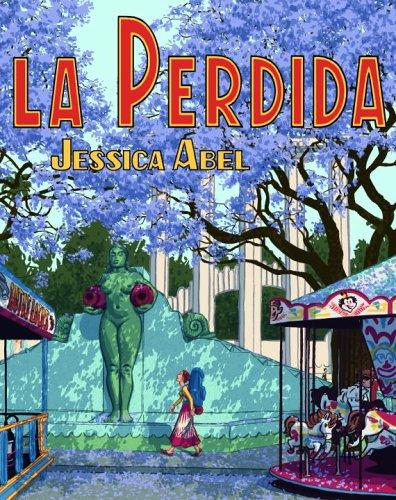La Perdida, written and illustrated by Jessica Abel and published in 2006, is not just a graphic novel; it’s a deeply personal and emotionally resonant exploration of identity, belonging, and the complexities of cross-cultural relationships. Abel, known for her work in alternative comics and graphic storytelling, brings her sharp observational skills and nuanced understanding of human behavior to this semi-autobiographical work. The story, set against the backdrop of Mexico City, speaks to the universal experience of searching for oneself while navigating the unfamiliar. It’s a story that feels particularly relevant today as we increasingly encounter diverse perspectives and grapple with the challenges of understanding other cultures. Find your copy here.
Plot & Setting
The narrative follows Carla, a young American woman who moves to Mexico City with her boyfriend, Harry, a self-absorbed writer, seeking inspiration. What begins as a romantic adventure quickly devolves into a struggle for Carla as she grapples with a sense of alienation and a growing disillusionment with Harry and their relationship. The initial vibrant, chaotic energy of the city, conveyed through Abel’s detailed and expressive artwork, soon becomes a mirror to Carla’s inner turmoil. Her interactions with locals, both positive and negative, highlight her outsider status, forcing her to confront her own assumptions and biases. Abel masterfully captures the feeling of being both intrigued and overwhelmed by a new culture. The pacing of the story is deliberate, allowing the reader to fully immerse themselves in Carla’s emotional journey.
Character Analysis
Carla is a complex and relatable character. She begins as a somewhat naive and romantic young woman, but as the story progresses, she becomes increasingly independent and self-aware. Her relationship with Harry is portrayed with unflinching honesty; it’s a slow burn of disillusionment, and the reader witnesses her growing frustration with his self-centeredness. The supporting characters, such as the charismatic and enigmatic Lucia, add depth and nuance to the narrative. Lucia acts as both a guide and a source of tension for Carla, pushing her to question her own identity and desires. The relationships in La Perdida are not idealized; they are messy, complicated, and deeply human. Order today and experience Carla’s journey
Themes & Emotional Impact
The novel delves into several potent themes, including cultural displacement, identity formation, and the often-uncomfortable realities of relationships. It examines the romanticization of foreign cultures and the challenges of integrating into a new society. La Perdida resonates because it captures the universal experience of searching for belonging and trying to figure out who you are when you’re removed from familiar surroundings. The book’s emotional core lies in Carla’s journey of self-discovery, a journey that often involves confronting uncomfortable truths about herself and her relationships. I particularly connected with Carla’s struggle to find her place in a new world, something I experienced during my own travels abroad. It reminded me that personal growth often happens when we’re pushed outside our comfort zones.
Writing Style & Narrative Techniques
Abel’s distinct visual style, characterized by bold lines and expressive characters, perfectly complements the narrative. The use of color is particularly effective, shifting from vibrant hues in the beginning to more muted tones as Carla’s emotional state darkens. Her dialogue feels natural and authentic, capturing the nuances of everyday conversations. The narrative structure is carefully crafted, moving seamlessly between present-day events and flashbacks, providing the reader with a comprehensive understanding of Carla’s past and present. The book’s visual storytelling is as crucial to its emotional impact as the text itself. Abel is not just a writer but a visual storyteller, and her skill is evident in every panel. Check pricing on Amazon.
Conclusion
La Perdida is a powerful and insightful graphic novel that stays with you long after you finish reading. It’s more than just a story about a young woman in Mexico; it’s a profound meditation on identity, relationships, and the search for meaning. The book matters because it provides a nuanced perspective on cross-cultural experiences and reminds us that self-discovery is rarely easy. The raw honesty of the characters and the emotional depth of the story make it a compelling read for anyone who has ever felt lost or out of place. I highly recommend this book to readers interested in graphic novels, personal narratives, and stories that explore complex human emotions. Fans of books like Fun Home by Alison Bechdel or Persepolis by Marjane Satrapi may also find themselves drawn to the storytelling in La Perdida. It’s a book that invites reflection and leaves a lasting impression. Click to buy it now.

